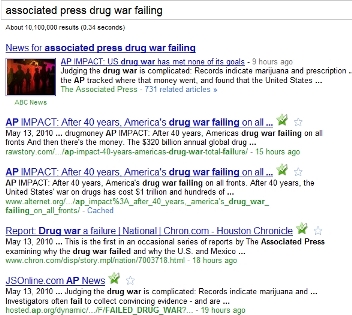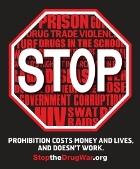Policing the drug laws is supposed to be dangerous work, but the numbers year after year don't seem to bear that out. And too often when police do get killed enforcing prohibition, the very aggressive tactics that they claim keep them safe are the ones that do them in. The human (and canine) targets of aggressive raids pay the price, too.
The fever to free the weed burned hot in Rome and Buenos Aires and Mexico City last Saturday as the second round of the Global Marijuana March took place.
The Associated Press has just declared the war on drugs a failure. When will the politicians admit the same?
2010 is a critical year in the effort to end prohibition and the war on drugs. The StoptheDrugWar.org (DRCNet) "Changing Minds, Changing Laws, Changing Lives" campaign is asking for you to pitch in -- your support is more important now than it has ever been before!
Police in Columbia, Missouri, have endured all kinds of criticism in the week since a video of one of their SWAT raids went viral. This week, they issued new policies regarding SWAT raids. It's a start, but only a start.
Canadian Justice Minister Rob Nicholson Monday signed the extradition for "Prince of Pot" Marc Emery to begin serving five years in a US federal prison for selling pot seeds over the Internet. He was jailed on the spot in Vancouver, and could be in the American gulag by the time you read this.
The beat goes on. This week, we have a trio of ethically-challenged cops, and, of course, another crooked jail guard.
El Chapo had the personal cell phone numbers of Mexican officials charged with hunting him down? A seizure this week hints at the extent of the Sinaloa Cartel's intelligence gathering and just why Chapo Guzman always seems to be at least one step ahead of the authorities.
Singapore's law minister justifies the mandatory death penalty for drug offenders. Unlike the rest of us losers, Singapore hasn't lost the war on drugs, he said.
Up to a quarter of the Afghan poppy crop could be lost to a mysterious fungal disease especially afflicting Helmand and Kandahar provinces. Suspicious Afghan farmers are pointing fingers at the US and NATO.
In a series of public opinion polls last year in Latin America, the Gallup organization looked at perceptions of drug trafficking. The results may be surprising.
Events and quotes of note from this week's drug policy events of years past.
Do you read Drug War Chronicle? If so, we need your feedback to evaluate our work and make the case for Drug War Chronicle to funders. We need donations too.
Apply for an internship at DRCNet and you could spend a semester fighting the good fight!
"Drug Czar Admits Failure, Pledges to Continue It," "John Walters Still Thinks the Drug War is Awesome," "The Dog-Killing Drug Raid That Pissed Off America," "Do Cops Get Drunk at Anti-Pot Conferences?," "Utah Cops Create Website for Snitching on Marijuana Gardens," "Gary Johnson Talks Marijuana Legalization on the Colbert Report," "DEA Accidentally Argues for Marijuana Legalization."
Tomorrow is National Law Enforcement Memorial Day, a day to mark the service of those law enforcement officers who died in the line of duty. Fortunately for drug law enforcers, last year did not leave a lot of fallen officers to memorialize. And while it may cut against the grain of countless pop culture depictions about dangerous drug dealers, last year was not unusual.

lioness statue, National Law Enforcement Officers Memorial (courtesy wikipedia.org)
Doing drug law enforcement is just not that dangerous. According to statistics on police line of duty deaths compiled by the
Officer Down Memorial Page, only three law enforcement officers were killed enforcing drug laws last year, and those three were not undercover narcs doing drug buys or SWAT team raiders busting down doors, but DEA agents who died in a helicopter crash in Afghanistan. (One officer,
Michael Crawshaw of the Penn Hills Police Department in Pennsylvania, was killed responding to a drug-trade murder in which one drug trafficker killed another over a drug debt. This officer death was certainly related to the drug war; we rightly or wrongly did not include him in the count because he was responding to a murder, not a drug crime.)
By contrast, according to FBI preliminary figures, 48 law enforcement officers were "feloniously killed in the line of duty"-- none of them doing drug law enforcement. But that was less than half of the 126 line of duty officer deaths last year. Auto accidents killed 34, drunk drivers killed nine, heart attacks killed nine more, seven died after being struck by vehicles, and four died in aircraft accidents (including the three DEA officers). Duty-related illness, 9/11-related illness, and motorcycle accidents accounted for three each, two died after being shot accidentally, and one was beaten to death.
According to historical data provided to the Chronicle by the National Law Enforcement Officers Memorial Fund, which also compiles statistics on police line of duty deaths, last year's low death toll among officers enforcing the drug laws is not a fluke. In the decade between 1978 and 1988, an average of 6.5 officers were killed each year; in the following decade, the number was 6.2; and in the last 10 years, an average of 4.3 officers were killed each year enforcing the drug laws. The single bloodiest year for drug law enforcement was 1988, when 12 officers died.
In 2008, the number of police who died maintaining drug prohibition was seven; in 2007, it was four; it 2006, it was five; in 2005, it was four. When placed in the context of the more than 1.5 million drug arrests made in each of those years, it is clear that only one in every several hundred thousand drug arrests leads to an officer's death. During the past 10 years, the odds were less than 1 in 350,000.
But while drug law enforcement is not in itself that dangerous for police, certain police tactics raise the risk -- for both law officers and the recipients of their attention. Of the 20 officers killed enforcing the drug laws since 2005, nine were killed in drug raids and five were killed doing undercover work.
Two of the 2008 officer deaths demonstrate the risks involved in aggressive forced-entry raids. In Virginia, Chesapeake Police Detective Jarrod Brent Shivers, who also doubled as the door-rammer for the SWAT team, was killed by Ryan Frederick, who shot through a door in fear for his life in reaction to the home invasion. Frederick, who had recently been burgled, was eventually sentenced to 10 years in prison. The cops were looking for a marijuana grow, but found only Japanese maple trees which the informant apparently mistook for pot.
FBI Agent Samuel Steele Hicks died in another raid gone bad. While serving a forced entry narcotics search warrant in Indiana Township, Pennsylvania, Hicks was shot and killed by the suspect's wife, Christina Korbe, who fired blindly from a bedroom at what she later said she thought were intruders. Although Korbe was not a target in the investigation of an 18-year drug conspiracy, she has since been charged with a string of drug offenses in addition to facing a murder charge.
Aggressive law enforcement tactics, such as dynamic entries (kicking in the door) and SWAT-style assaults have also left dozens of homeowners dead. (See Cato Institute analyst Radley Balko's now famous report, "Overkill: The Rise of Paramilitary Policing in America and the police militarization archive at his blog, The Agitator for page after page of stomach-turning reports.)
In November 2006, undercover Atlanta narcotics officers doing a forced entry raid shot and killed 92-year-old Kathryn Johnston after the woman fired at the people breaking down her door in a high-crime neighborhood. In this case, at least, the police were held accountable, in part because their conspiracy to cover up their fabrication of evidence for a search warrant quickly unraveled. Three of them went to prison.
- On January 6, 2008, police in Lima, Ohio, shot and killed a 26-year-old mother of six, Tarika Wilson, during a raid aimed at her boyfriend. The police shooter was eventually found not guilty for killing her.
- The following day in North Little Rock, Arkansas, a police SWAT team raided the home of Tracy Ingle. Awakened by a ram battering his door and thinking he was under attack by armed robbers, Ingle grabbed a broken pistol to scare them off. Officers fired multiple shots, wounding him five times. He spent a more than a week in intensive care before police removed him, took him to the police station, and questioned him for five hours. He was charged with running a drug enterprise even though no drugs were found.
- In May, Connecticut police raiding an apartment after being informed that people were smoking crack there, shot and killed Gonzalo Guizan, who was unarmed. Police said he charged at them. All they found was a crack pipe.
- This year, at least two people, Florida grandmother Brenda Van Zweiten and Memphis resident Malcolm Shaw were killed in separate SWAT-style raids on their homes the same week in March. In both cases, police claimed the victim was armed. Whether Van Zweiten, who was raided over small-scale drug dealing out of her house, or Shaw, who was raided over simple drug possession (!) intended to attack police or were merely trying to defend themselves from intruders breaking into their homes, will never be known because they are dead.
It's not just people. Dogs also seem to be a favorite target of drug-raiding police. That has certainly become an issue in the February SWAT raid in Columbia, Missouri (see related story here), which has resulted in widespread outrage after a video of the raid found its way to YouTube last week. In that incident, police executing a search warrant over alleged marijuana sales killed one dog and wounded another, and terrified the suspect's wife and child, but found only a tiny amount of weed and a pipe.
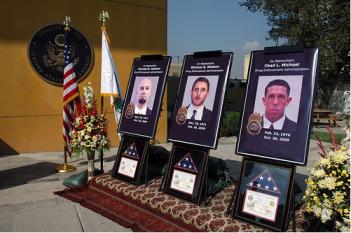
DEA memorial for agents killed in Afghanistan
Another infamous dog-killing SWAT raid occurred in 2008 in Maryland. Cheye Calvo, the mayor of the Washington, DC, suburb of Berwyn Heights, saw his two dogs shot and killed by a Prince George's County SWAT team that burst into his home after his mother-in-law accepted delivery of a package containing marijuana. Calvo and his family were twice victimized, once by the pot traders who used his address to have their dope sent to, and again by the gung-ho, itchy trigger finger police.
It is unclear how many people were killed by police enforcing the drug laws in general or conducting drug raids in particular. Although in 1999 Congress authorized legislation requiring law enforcement agencies to submit such data, it neglected to fund the program. The incidents mentioned above are only some of the most egregious and well-publicized, but they suggest that even if doing drug raids isn't particularly dangerous for police, it is for their victims.
There is a better way, said a pair of former drug enforcement officers consulted by the Chronicle. It might be succinctly expressed as: "Chill out."
"There is no question that in the bulk of those raids, these are not folks with any history of violence, said former SWAT team member US Special Forces sergeant James Hanson, now communications director for the veterans' group Warrior Legacy Foundation. "That should be the first hurdle: Does he have a propensity for violence? Drug warrants almost never have that level of threat. The fears police claim to have are overstated."
But, he suggested, those fears can come to fruition precisely because of aggressive policing tactics. "If you dig deeper on the two or three that happened in 2008, it was the dynamic entry that triggered the violent incident," said Hanson. "Dynamic entry into a house is the most dangerous thing about it. Just wait for the guy to go to the 7-11, for goodness' sake," he exclaimed. "That way, you're not busting down doors, endangering kids, and escalating the situation."
Cops didn't used to need paramilitary squads to do drug busts, said retired LAPD detective Dave Doddridge, who had long experience enforcing prohibition. "We weren't scared, we'd go knock on doors," he recalled. We didn't need the overkill. When I first joined the department back in 1973, at roll call, they would read off the houses, and we would drive up in a patrol car and knock on the door. We managed," he said.
"I spent several years down in South Central kicking in doors and raiding homes, and probably served 50 search warrants," the former narc added. "We weren't SWAT, just a couple of narcotics detectives with our vests on, and none of us got seriously injured. There was seldom any resistance."
SWAT was originally envisioned as elite squads designed for rare but dangerous situations, such as hostage situations, barricaded suspects, or terrorist attacks. But in a case of mission creep gone mad, they are now used routinely for drug raids -- as noted above, to the tune of 50,000 or so a year.
"In a lot of these cases, because, thanks to funds from Homeland Security, they have a SWAT capability, they have to have a reason for having it," said Hanson. "Using SWAT to serve drug warrants allows them to say it's worthwhile, and overstating the potential for violence is part of that."
"SWAT definitely takes control of the situation, but that's not necessary for a family home," said Doddridge. "Maybe if there's a gang with a big drug house and they're manufacturing you should send in SWAT, but if it's a house, just send in an informant, buy the drugs, and get an arrest warrant. You don't need SWAT for that."
But the SWAT philosophy is well-entrenched in American policing. Changing that mentality, or at least reining in SWAT's overuse and abuses will be a difficult challenge. But it can be done.
In the Columbia SWAT raid case, public outrage led quickly to new restrictions on SWAT team deployments and new rules for their use executing search warrants. Similarly, public outrage in the case of Cheye Calvo, the Maryland mayor, led to the passage of the first state law in the country aimed at reining in SWAT. That law requires every department that has a SWAT team to report regularly on its activities.
"The Maryland law is a perfect example of what needs to be done," said Hanson. "There was no auditing of how many times these teams were used in dynamic entries -- nobody from the civilian side was looking at it. If we're going to ask police to serve drug warrants, we get to decide how they do it. We don't want to put police at risk, but neither do we want to put citizens at risk. There are too many instances of bad warrants, wrong addresses, or lying informants."
Doddridge, who has become a member of Law Enforcement Against Prohibition (LEAP) since he retired from the force has another idea. "We need a crack team of attorneys who are good at lawsuits to just go around and start suing like crazy," he suggested. "When they have to start worrying about paying money, that'll make them start looking over their shoulders."
back to top
Last Saturday saw the second phase of the Global Marijuana March. While the May Day marijuana marches two weeks ago appeared to be concentrated in North America, last Saturday it was the turn of the Europeans and Latin Americans to take center stage.

Buenos Aires (Mike Bifari in front row, wearing green)
Known variously as the Global Marijuana March, the Million Marijuana March, the
World Marijuana March, or, more informally, International Weed Day, the actions in cities around the globe are designed to advance the cause of marijuana legalization and celebrate the global cannabis culture.
From nerve centers at Cures Not Wars in New York City, Cannabis Culture magazine in Vancouver, and the European NGO Coalition for Safe and Effective Drug Policies (ENCOD) in Brussels, activists in more than 320 cities across the planet took the local initiative in the own communities. In some places, particularly Canada and New Zealand on May 1 and Rome and Latin America last Saturday, marchers came out in the thousands, while in others, including small communities and college campuses across the US, the number was in the dozens or possibly the hundreds.
During the first phase of the Global Marijuana March, the largest turnout was in Toronto, where an estimated 20,000 people rallied for legalization and to free "Prince of Pot" Marc Emery. (See related story here.) That turnout was exceeded this week in Rome, where an estimated 30,000 people marched and, quite possibly, in Mexico City, where no crowd estimates were made, but where video of the march shows a multitude of marchers filling the street for block after block. Buenos Aires, meanwhile, was the scene of another large turnout, with organizers there estimating the crowd at 8,000.
The march in Rome, while the largest world-wide this year, was smaller than usual, said Alberto Sciolari of the group Mefisto, which organized the event. "This year, we didn't allow techno sound systems on trucks, just some reggae, to enhance specifically cannabis awareness among participants and to avoid problems with young people possibly using chemical drugs and not caring about cannabis," he said. "So the march was smaller, but we were happier."
While Sciolari reported no problems with police at the march, there have been lots of problems with police for Italian pot smokers recently, and the march addressed that issue. "It was dedicated to the victims of prohibition, of which we've had so many in recent times," he said. "We also had a press conference with relatives of some of the victims Saturday morning."

New York (courtesy Andrew Seidenfeld)
By contrast, turnouts were smaller in Northern Europe this year, reported ENCOD's Joep Oomen. "There were about 150 people in Brussels, 500 in Paris, and 1,000 in Amsterdam," he said, laying the blame on cold, chilly weather.
In Buenos Aires, an Argentine cannabis community energized by last year's court rulings invalidating the law against marijuana possession (Congress has yet to draft a new one), left its traditional rallying spot at Parque Planetario and took to the streets, marching first to the Plaza de Mayo, home of the presidential palace, then down Avenida de Mayo to Congress.
"This last march was historic, nothing will be the same after this incredible demonstration," said a jazzed Mike Bifari, one of the organizers and speakers at the rally. "We were tired of just sitting there and doing nothing; we wanted our voices to be heard. And this march was so big and energetic, like never before, because there were so many groups organizing the rally and people were coming from all over the province of Buenos Aires, as well as from the popular neighborhoods in the city itself."
Speakers honored the dead, including Edith "La Negra," a famous Argentine pot smoker and Jack Herer, said Bifari. "It was like his spirit was there telling us all the benefits of our lovely plant," he said.
The theme in Buenos Aires was "stop the raids against our brothers, stop the police from arresting people for marijuana, and release our brothers in prison," Bifari said. While Congress dawdles in writing a new pot law, "We suffered a few raids these last few months, mainly in the interior of the country," he said.
"One thing that everybody agrees on is that the law must catch up with us because it can't stop our growing healthy cannabis movement, especially now that we know how to gain the streets when we need to."
In Mexico City, where the annual march celebrated its 10th anniversary, thousands packed the Zocalo before marching between the towers of downtown. Organized by AMECA (the Mexican Association for Cannabis Studies) and nearly a dozen other groups and collectives, marchers called for legalization of the weed, not the pseudo-decriminalization passed by the government last year.
"We are at a conjunctural moment," said AMECA's Leopoldo Rivera Rivera, citing the prohibition-related violence plaguing Mexico even as the US -- the largest market by far for illicit Mexican drugs -- appears headed toward relaxing its drug laws.
In Rio de Janeiro, about 1,500 marched for marijuana legalization on May Day, reported Luiz Guanabara of Psicotropicus. Marches took place in other Brazilian cities last Saturday, except for Fortaleza, where a judge blocked the march as an "apology for crime."
And so, another year's worth of Global Marijuana Marches have come and gone. Will next year be the year people take to the streets to celebrate landmark advances in marijuana legalization in the US? Stay tuned.
back to top
In a major, broad-ranging report released Thursday, the Associated Press declared that "After 40 Years, $1 Trillion, US War on Drugs Has Failed to Meet Any of Its Goals." The report notes that after four decades of prohibitionist drug enforcement, "Drug use is rampant and violence is even more brutal and widespread."
The AP even got drug czar Gil Kerlikowske to agree. "In the grand scheme, it has not been successful," Kerlikowske said. "Forty years later, the concern about drugs and drug problems is, if anything, magnified, intensified."
The AP pointedly notes that despite official acknowledgments that the policy has been a flop, the Obama administration's federal drug budget continues to increase spending on law enforcement and interdiction and that the budget's broad contours are essentially identical to those of the Bush administration.
Here, according to the AP, is where some of that trillion dollars worth of policy disaster went:
- $20 billion to fight the drug gangs in their home countries. In Colombia, for example, the United States spent more than $6 billion, while coca cultivation increased and trafficking moved to Mexico -- and the violence along with it.
- $33 billion in marketing "Just Say No"-style messages to America's youth and other prevention programs. High school students report the same rates of illegal drug use as they did in 1970, and the Centers for Disease Control and Prevention says drug overdoses have "risen steadily" since the early 1970s to more than 20,000 last year.
- $49 billion for law enforcement along America's borders to cut off the flow of illegal drugs. This year, 25 million Americans will snort, swallow, inject and smoke illicit drugs, about 10 million more than in 1970, with the bulk of those drugs imported from Mexico.
- $121 billion to arrest more than 37 million nonviolent drug offenders, about 10 million of them for possession of marijuana. Studies show that jail time tends to increase drug abuse.
- $450 billion to lock those people up in federal prisons alone. Last year, half of all federal prisoners in the US were serving sentences for drug offenses. [Editor's Note: This $450 billion dollar figure for federal drug war prisoners appears erroneous on the high side. According to Department of Justice budget figures, funding for the Bureau of Prisons, as well as courthouse security programs, was set at $9 billion for the coming fiscal year.]
The AP notes that, even adjusted for inflation, the federal drug war budget is 31 times what Richard Nixon asked for in his first federal drug budget.
Harvard University economist Jeffrey Miron told the AP that spending money for more police and soldiers only leads to more homicides. "Current policy is not having an effect of reducing drug use," Miron said, "but it's costing the public a fortune."
"President Obama's newly released drug war budget is essentially the same as Bush's, with roughly twice as much money going to the criminal justice system as to treatment and prevention," said Bill Piper, director of national affairs for the nonprofit Drug Policy Alliance. "This despite Obama's statements on the campaign trail that drug use should be treated as a health issue, not a criminal justice issue."
"For the first time ever, the nation has before it an administration that views the drug issue first and foremost through the lens of the public health mandate," said economist and drug policy expert John Carnevale, who served three administrations and four drug czars. "Yet... it appears that this historic policy stride has some problems with its supporting budget."
Of the record $15.5 billion Obama is requesting for the drug war for 2011, about two thirds of it is destined for law enforcement, eradication, and interdiction. About one-third will go for prevention and treatment.
The AP did manage to find one person to stick up for the drug war: former Bush administration drug czar John Walters, who insisted society would be worse if today if not for the drug war. "To say that all the things that have been done in the war on drugs haven't made any difference is ridiculous," Walters said. "It destroys everything we've done. It's saying all the people involved in law enforcement, treatment and prevention have been wasting their time. It's saying all these people's work is misguided."
Uh, yeah, John, that's what it's saying.
back to top

Dear friend of drug policy reform:
I am writing today to ask you to step up for drug policy reform. 2010 is a critical year in drug policy, with great opportunities for changing minds, laws, and lives:
There is a long, hard road still ahead, but things are definitely moving our way. Like every nonprofit, our funding has been affected by the troubled state of the economy, and we need your help. Can we count on your support in this important year? Please make a generous donation to StoptheDrugWar.org (DRCNet) today!
The support of our generous members has been part of a winning combination that saw us draw nearly two million annual visitors to our web site last year -- the most yet! -- and which saw opinion leaders in the blogosphere using our work on a regular basis. (See links about this below.) StoptheDrugWar.org, thanks to you, is the #1 source for news, information and activism promoting sensible drug law reform and an end to prohibition worldwide. The more we do at StoptheDrugWar.org, the faster the reform movement will grow and the sooner that minds, laws and lives will change.
Your support counts now more than ever -- please join our 2010 "Changing Minds, Changing Laws, Changing Lives" campaign by donating to StoptheDrugWar.org today.
I would like to send you some free gifts to show our appreciation. For a contribution of $30 or more, choose either the important new DVD, 10 Rules for Dealing with Police, or its classic predecessor, Busted: The Citizen's Guide to Surviving Police Encounters -- or choose either of our popular StoptheDrugWar.org t-shirts -- "alcohol prohibition/drug prohibition" or "consequences of prohibition." For a gift of $55 or more, you get to pick any two... for a gift of $80 or more, pick any three... for a gift of $100 or more you can get all four! (Want to substitute? No problem. Choose any item from our inventory of books, videos and StoptheDrugWar.org items.)
By joining today, you will make an immediate impact by helping StoptheDrugWar.org:
We are truly seeing more good things happen than ever before -- and the road ahead while challenging is also promising. Please donate to StoptheDrugWar.org today - with your help, we can win this.
Sincerely,

David Borden
Executive Director, StoptheDrugWar.org (DRCNet)
P.S. Prohibition does not work -- and more and more people know it. Now is the perfect time to galvanize support for the cause. Please send in your donation and get your thank-you gifts today! Thank you for your support.
back to top
Faced with widespread public outrage and even death threats after the release of a video of a February marijuana raid in which two dogs were shot, one killed and one wounded, by SWAT team members in a family home with a young child present, the Columbia, Missouri, Police Department Monday moved to dampen the uproar. At a press conference, Chief Ken Burton announced he was immediately imposing new restrictions on the way the department serves search warrants.
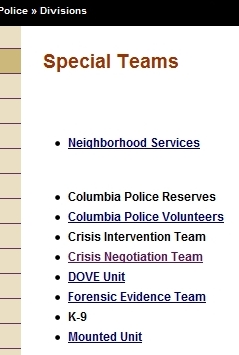
CPD web site with SWAT team section's links and pages removed
The press conference failed to assuage public anger over the raid. At a Wednesday night Police Review Board meeting frustration with the department that extended beyond the raid was evident. (Read a local press account of the meeting
here.
Although the raid occurred in February, the video did not appear until last week, after homeowner Jonathan Whitworth pleaded guilty to possession of drug paraphernalia. Since then, the video has gone virulently viral and has now exceeded the one million views mark on YouTube. It shows the SWAT team pushing through the front door, aggressively entering while yelling commands and obscenities, and includes the sounds of barking and gunfire, following by the yelping of the dying and wounded dogs. The video also shows Whitworth's wife and seven-year-old son being hustled away by police, while Wentworth himself is forced to the ground with guns pointed at him.
According to the affidavit used to obtain the search warrant, Whitworth was a marijuana dealer selling high-grade pot. The affidavit cites two "truthful and reliable" snitches as saying so. It also includes the results of a search of Whitworth's trash in which police found THC residues. Despite the information in the affidavit, police found only a pipe and a small quantity of pot.
Chief Burton acknowledged that his officers had committed errors and announced six policy changes for the way the SWAT team handles search warrants. He said they were among the most restrictive SWAT policies in the country.
"The public can be assured that a similar incident is not going to happen again without somebody's head rolling because it is now the policy," Burton said. "We know what we are going to do. We're telling you how we are going to handle these things."
Here are the policy changes:
IMMEDIATE CHANGES TO COLUMBIA POLICE NARCOTIC SEARCH WARRANT SERVICE PROTOCOL
- The Narcotics Sergeant and SWAT Commander are being removed from the decision making process on whether or not, and how, a narcotic search warrant will be served.
- Once probable cause has been established to obtain a search warrant for narcotics, the target location will be kept under surveillance. If the surveillance is interrupted or compromised for any reason, service of a search warrant may not be authorized, or the manner in which it is served may be changed.
- Warrant services for narcotic-related search warrants will be served within a reasonable time after the warrant is obtained, generally within 8 hours of receipt.
- Prior to serving the search warrant, the Bureau Commander (Captain) over the area will be briefed about the warrant, and he or she will review all available intelligence related to the request, and will decide how the warrant will be served. Assessing the potential danger to officers, innocent bystanders, and suspects, along with what law enforcement purpose will be served by serving the search warrant, will be weighed in their decision.
- All available intelligence will be used to attempt to mitigate unnecessary risk to any person. Issues such as children being present will be strong evidence that dynamic entry should not be considered except under the most extreme circumstances. SWAT Officers always have and will continue to be bound by the Columbia Police Department policy regarding any use of force.
They will, however, still shoot your dog, at least as far as this policy is concerned.
back to top
Canadian Justice Minister Rob Nicholson Monday ordered that his country's most famous marijuana legalization advocate be extradited to the US to serve a five-year federal prison sentence. Erstwhile pot seed entrepreneur and Cannabis Culture magazine publisher Marc Emery turned himself in to authorities and is now in custody awaiting imminent extradition to the US.

Marc and Jodie Emery (courtesy Cannabis Culture)
Emery and two employees, Michelle Rainey and Greg Williams, were arrested in Vancouver in 2005 by Canadian police acting at the behest of US authorities, who had indicted the trio in Seattle for selling pot seeds over the Internet to customers in the US. After Rainey and Williams were offered plea bargains that allowed them to stay in Canada, Emery himself pleaded guilty to one count of marijuana distribution in exchange for a five-year sentence. He had faced up to life in prison for his pot seed sales.
Prior to his arrest in 2005, Emery was becoming an increasingly irritating burr under the saddle of prohibitionists on both sides of the border. He poured much of his pot seed profits into pro-pot political formations, both in Canada and across the border, agitating relentlessly for legalization as he vowed to "overgrow the government" and confronting then US drug czar John Walters when he visited Vancouver.
After Emery's arrest, then DEA administrator Karen Tandy issued a press release calling the bust a "significant blow to the US and Canadian marijuana trade, and to the marijuana legalization movement" and crowed about taking down Emery and his "propagandistic magazine."
But that was five years ago. Since then, Emery has continued to agitate for legalization, Cannabis Culture has continued to publish (albeit only online now), and he has used his own predicament as yet another tool toward his broader goal. He generated thousands of letters and phone calls to Ottawa in his support, as well as appeals from members of Parliament from all major parties.
Even on the steps of the British Columbia Supreme Court, where he turned himself over Monday morning, Emery was still talking. "I think the best thing that could happen to our movement is that the minister decides, foolishly, to extradite me. Canadians will be very, very angry and punish this government," he told reporters.
"If I'm extradited, I've told my supporters that every Conservative member of Parliament is to be hounded endlessly and unmercifully until they are defeated in the next or following elections," he said. "It's to be a life project for them as long as I am incarcerated in the United States or Canada."
Emery is seeking to serve his time in Canada, one of attorneys, Kirk Tousaw, told The Canadian Press. "The United States has already agreed to support Mr. Emery's treaty transfer back to Canada to serve his sentence here," Tousaw said. "We certainly would anticipate the minister of public safety would agree."
Emery, who has been arrested repeatedly for his marijuana activism, said he had no regrets. "I think of myself as a great Canadian -- I've worked my whole life for individual freedom in this country, I've never asked for anything in return," Emery told reporters. "And now I will be possibly handed over to the United States for a five-year sentence for the so-called crime of selling seeds from my desk to consenting adults all over the world and the United States. I'm proud of what I've done, and I have no regrets."
On Tuesday, Vancouver New Democratic Party MP Libby Davies called on Public Safety Minister Vic Toews to "stop the extradition" of Emery by allowing him to serve his sentence in Canada. American officials were agreeable to that approach, she said, but "your government has refused to cooperate." Davies pointedly added that Emery was being extradited to serve time in the US "for actions that are not worthy of prosecution under Canadian laws."
Read the latest update on the Cannabis Culture web site for more info on the continuing campaign to free Marc Emery.
back to top
The beat goes on. This week, we have a trio of ethically-challenged cops, and, of course, a crooked jail guard. Let's get to it:

If we can't keep drugs out of the prisons, how can we keep them out of the country?
In Newark, New Jersey,
a Newark police officer was indicted Tuesday by a federal grand jury for being part of a ring of people who were "stealing money and narcotics from narcotics dealers and their associates," according to the indictment. Sgt. Michael Lalley is charged with obstructing an FBI investigation and witness tampering. He is accused of asking one person to lie about a sexual relationship they had when that person was a minor. He is also accused of paying that person $60 for sex acts at his home and at a Newark police station and giving her cocaine and marijuana. He is accused of similar offenses with another woman, as well. The offenses all occurred in the 1990s.
In Salt Lake City, a former West Jordan police sergeant was arrested last Friday on charges he dealt drugs and stole seized money. Aaron Jensen, 34, is charged with distribution of a controlled substance, a second-degree felony, and two counts of misuse of public money, a third-degree felony. In one incident, Jensen was given $1,239 in cash that was seized during an arrest, but when the man was released, Jensen returned only $583. In another, he allegedly bought cocaine and heroin from two men in 2008. The two men later told investigators Jensen had contacted them earlier and said he would not arrest them if they worked as snitches for him. When Jensen was fired as a police officer, other officers cleaning his desk found several balloons of heroin and cocaine, as well as copies of the drivers' licenses for the two men from whom he bought drugs.
In Madison, Wisconsin, a state Justice Department narcotics agent pleaded not guilty last Friday to stealing drug money in an FBI sting. Agent Johnny Santiago was charged in March with theft of government property. He allegedly stole $1,100 that FBI agents planted in a vacant store he was sent to search.
In Albuquerque, a Metro Detention Center guard was arrested Tuesday after he was caught carrying heroin, methamphetamine, marijuana, and tobacco as he showed up for work. Guard Anthony Kennedy went down following a two-week investigation after jail administrators got a tip he might be bringing contraband into the jail. It is unclear what the formal charges will be at this point.
back to top
by Bernd Debusmann, Jr.
Mexican drug trafficking organizations make billions each year smuggling drugs into the United States, profiting enormously from the prohibitionist drug policies of the US government. Since Mexican president Felipe Calderon took office in December 2006 and called the armed forces into the fight against the so-called cartels, prohibition-related violence has killed over 19,000 people, with a death toll of nearly 8,000 in 2009 and over 3,000 so far in 2010. The increasing militarization of the drug war and the arrest of several high-profile drug traffickers have failed to stem the flow of drugs -- or the violence -- whatsoever. The Merida initiative, which provides $1.4 billion over three years for the US to assist the Mexican government with training, equipment and intelligence, has so far failed to make a difference. Here are a few of the latest developments in Mexico's drug war:
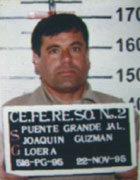
Joaquin Guzman-Loera, aka El Chapo (wanted photo from the Bureau of International Narcotics and Law Enforcement Affairs, US State Dept.)
In Ciudad Acuna, Coahuila, police discovered the body of Froylan Collazo Badillo, a local police commander. Badillo had been shot and killed as his car waited at a stoplight.
Saturday, May 8
Near Acapulco, police discovered three headless bodies showing signs of torture. Additionally, police found five bodies in a car left on a dirt road 50 miles to the north, near the small settlement of Tecpan de Galeana. The men had also been tortured and shot repeatedly.
Sunday, May 9
In San Fernando, Tamaulipas, five men were killed after a shootout between two armed groups. Reports indicate that at least 15 bullet riddled vehicles were found at the scene of the incident, which took place on the San Fernando-Mendez highway. This brings to at least 14 people killed since the beginning of April in and around the town of San Fernando, which has a populace of 60,000. Tamaulipas has seen a dramatic increase in violence over the last few months as the Zetas Organization battles their former employers, the Gulf Cartel.
Monday, May 10
In Sonora, the body of an American citizen was discovered partially buried in a creek 60 miles from the city of Nogales. Ronald Ryan, 67, was from Phoenix, AZ and had been reported missing May 3rd. Three men who had left Ryan's truck at a carwash in the town of Santa Ana were arrested on Tuesday. The men, all between the ages of 18 and 21, were found to be in possession of assault rifles and marijuana. Local media reported that two of the men are the son and nephew of Jose Vasquez Villagrana, a high-ranking member of the Sinaloa Cartel who was arrested by Mexican authorities in
February.
In Guanajuato, three men were killed at an auto mechanic's shop. The three men were all members of a local motorcycle club. Just hours earlier, two other men were shot dead in a market in another part of the city. It is unclear if the killings were related. This brings to 58 the number of murders in the city of Guanajuato this year.
Tuesday, May 11
Captured cartel documents leaked to La Reforma newspaper indicate widespread payoffs of Mexican police and soldiers. The documents, which demonstrate a sophisticated counterintelligence operation on the part of the Sinaloa Cartel, also indicate the Sinaloa Cartel boss Joaquin "El Chapo" Guzman has been in possession of the personal cell phone numbers and e-mail addresses of officials who have been involved in the search for him. Guzman's Sinaloa Cartel is currently considered to be the strongest in Mexico by the US and Mexican governments.
Wednesday, May 12
Near Monterrey, the army raided a large training camp thought to be used by drug traffickers. The raid, which was carried out by heli-borne commandos and police, took place approximately 45 kilometers northeast of Monterrey. One suspect, who was described by authorities as "being too obese to escape" was shot and killed after opening fire on the soldiers. An unknown number of suspects escaped after being alerted to the sound of the helicopters. Some 200 assault rifles were seized at the site, along with a RPG'S, 60 fragmentation grenades, three anti-tank rockets, 12 stolen trucks, and several thousand rounds of rifle and pistol ammunition.
Also in Monterrey, the army detained 12 local policemen suspected of having ties to drug trafficking organizations. During the raid, the army and federal police took control of a municipal police station, where they arrested the 12 officers. Local police in Mexico are often known to be extremely corrupt and thoroughly infiltrated by cartels.
In Ciudad Juarez, authorities discovered the body of a groom and two members of his wedding party who had been kidnapped leaving a church four days prior. It has been reported that all three of the men were possibly American citizens. The bodies were found in the bed of a truck alongside a fourth man who may have not been at the wedding. The motive for the kidnapping and killings is unclear.
[Editor's Note: We rely on the Mexico City newspaper El Universal for our weekly body counts, but we are very skeptical of its count of 637 killed in the last week, significantly higher than the usual 200 or so. Look for a note next week on how we resolve this.]
Total Body Count for the Year: 3,870
Total Body Count for the Week: 637 (?)
Total Body Count since Calderon took office: 20,197
Read the last Mexico Drug War Update here.
back to top
An official of one of the world's leading drug executioner states has justified its mandatory death penalty for drug trafficking by saying to do otherwise would send the wrong signal to "drug barons." The state is Singapore, the authoritarian city-state on the tip of the Malay Peninsula, and the official was Law Minister K Shanmugam.

Singapore Anti-Death Penalty Campaign flyer featuring Yong Vui Kong case
Shanmugam made his remarks to the Straits Times Sunday when asked about the case of Malaysian Yong Vui Kong, 22, who was sentenced to death for smuggling 47 grams of heroin in 2007. His case has attracted international attention from human rights groups and is now before the Singapore Court of Appeal.
It would be wrong if drug smugglers got off too cheaply because of mitigating factors like youth or motherhood, he said. "We are sending a signal to all the drug barons out there: Just make sure you choose a victim who is young, or a mother of a young child, and use them as the people to carry the drugs into Singapore," the minister said.
In March, Yong's attorney argued before the appeals court that the mandatory death penalty for trafficking more than 15 grams of heroin was unconstitutional because it gave judges no discretion to consider mitigating factors. But the government responded that the sentence was in line with the law passed by Singapore's legislature.
According to a report on the death penalty for drug offenses from the International Harm Reduction Association, more than 400 people have been executed in Singapore since 1991, the majority for drug offenses. Drug executions accounted for 76% of all executions there from 1994 to 1999, and Singapore has been executing drug offenders at a rate of about 20 a year for the past decade.
It's worth it, said Shanmugam. The death penalty had been critical for suppressing drug trafficking and use in the city-state, and unlike most countries, it had not lost the war on drugs. "But you won't have human rights people standing up and saying: 'Singapore, you have done a great job, having most of your people free of drugs,'" he said.
back to top
Opium production in Afghanistan could be reduced by as much as a quarter this year because a fungal disease is afflicting the crop, UN Office on Drugs and Crime head Antonio Maria Costa told the BBC Wednesday. Farmers are quick to point the finger at the US and NATO, although evidence that the disease is anything but a natural phenomenon is lacking.

anti-opium posters, Nejat Center, Kabul
Costa said the fungus may have infected half the country's poppy crop. He added that opium prices had increased by about 50% in the areas affected.
Afghanistan produces more than 90% of the world's illicit opium. Increasing prices could mean increased revenues for Taliban insurgents, Costa suggested. The Taliban is sitting on large stockpiles of opium left from record levels of production in the last few years.
The fungus is appearing primarily in Helmand and Kandahar provinces, the heartland of both the Taliban and current Afghan opium production. US and NATO forces are about to launch major offensives in the area to try to clear and secure it. In a bid to win popular support in the region, the US has backed away from previously supported eradication campaigns, choosing instead to target drug traffickers linked to the insurgents. In the Bush administration, some officials had argued for the use of aerial spraying of herbicides, but that was rejected.
Still, some farmers think the US and NATO are poisoning their crops. Farmer Haji Mohammad in Nawzad told the BBC that he had seen a dramatic reduction in the amount of opium he was able to harvest. He described the fungus as an "aerial spray." He said his poppy harvest had shrunk 990 pounds last year to nine pounds this year.
"[It]... has affected my wheat cultivation and my chickens and other animals as well," he said. "The powder sprayed has a white color and I think it is chemical and if you squeeze it in your hand, water comes out of it."
Other farmers in the region also said they had seen a white substance on their crops. They, too, reported extensive crop damage and that livestock had been affected.
But Costa denied that the West was using biological warfare in Afghanistan. "I don't see any reasons to believe something of that sort," he said. "Opium plants have been affected in Afghanistan on a periodic basis."
back to top
In an analysis of 2009 polling it conducted across Latin America, Gallup has found data suggesting that illegal drug trafficking is common in communities throughout much of the region, including relatively wealthy, non-drug producing countries such as Chile and Costa Rica. In major countries such as Argentina, Brazil, and Venezuela, as well as smaller ones such as Costa Rica, Chile, Panama, and Uruguay, more than half of residents surveyed said drug trafficking or illicit drug sales were taking place in their neighborhoods.

drug smuggling tunnel
While Mexico's bloody prohibition-related violence garners headlines, that country ranked right in the middle, with 43% saying trafficking or sales were going on. Brazil garnered the dubious honor of having the highest percentage of people agreeing that trafficking or sales were occurring, with 70% saying so, followed by Chile, with 60%.
The countries where the fewest respondents reported local drug activity were El Salvador (15%), Bolivia (19%), and Honduras (23%). In all three cases, however, the number of respondents who said they didn't know or refused to answer exceeded 50%, as it also did in Paraguay, Nicaragua, and Peru. Do they not know or are they just not saying?
Oddly, the three-year (2007-2009) trend for the neighborhood drug activity question was flatter in Mexico than elsewhere. Some 38% of Mexicans said yes in 2007, 43% in 2008, and that figure was unchanged last year. In Brazil, by contrast, yes responses jumped from 52% in 2007 to 70% last year, while Argentina went from 49% to 55% and Chile went from 42% to 51%.
When asked if drug sales were increasing in their neighborhoods, Brazil again led the way, with 74% saying yes, followed by Costa Rica (53%), Panama (47%), and Uruguay and Argentina (46%). Again, oddly, Mexico was well down the list, with only 33%. Again, Central American countries were on the low end, and again, the usefulness of the data is obscured by high numbers of people who said they didn't know or refused to answer.
"The attention drawn by Mexico's drug violence should not overshadow the reality that illicit drug trafficking is common in much of Latin America," Gallup concluded.
back to top
May 15, 1928: Birth of Arnold Trebach, father of the modern drug policy reform movement.
May 14, 1932: "We Want Beer" marches against alcohol prohibition are held in cities across America -- 15,000 union workers demonstrate in Detroit alone.
May 18, 1971: Tapes released years later reveal that sometime between 12:16pm and 12:35pm, President Nixon says to entertainer Art Linkletter, "... radical demonstrators that were here... two weeks ago... They're all on drugs, virtually all."
May 15, 1988: Baltimore Mayor Kurt Schmoke calls for a national debate on decriminalization of illicit drugs. Schmoke is quoted in the Washington Post: "Decriminalization would take the profit out of drugs and greatly reduce, if not eliminate, the drug-related violence that is currently plaguing our streets."
May 19, 1988: Carlos Lehder is convicted of drug smuggling and sentenced to life in prison without parole, plus an additional 135 years. He had been captured by the Colombian National Police at a safe house owned by Pablo Escobar and extradited to the US.
May 20, 1991: The domestic heroin seizure record is set (still in effect today) -- 1,071 pounds in Oakland, California.
May 14, 1993: The New York Times reports that Judge Whitman Knapp said, "After 20 years on the bench I have concluded that federal drug laws are a disaster. It is time to get the government out of drug enforcement."
May 15, 1997: Conclusions from a comprehensive, long-term study by Kaiser Permanente (Oakland, CA) show no substantial link between regular marijuana smoking and death, but suggest that marijuana prohibition may itself pose a health hazard to the user.
May 20, 1997: Eighteen year-old Esequiel Hernandez, Jr., of Redford, Texas, becomes the first American to be killed on American soil by US soldiers in peacetime when he is shot on his own property by camouflaged Marines involved in a Joint Task Force-6 border drug interdiction operation. No drugs are found. Hernandez had never been suspected of or arrested for any criminal or drug-related activity.
May 15, 2001: Governor of Hawaii Ben Cayetano is quoted by the Associated Press: "I just think that it's a matter of time that Congress finally gets around to understanding that the states should be allowed to provide this kind of relief [medical marijuana] to the people. Congress is way, way behind in their thinking."
May 16, 2001: Regina McKnight is convicted and sentenced to 12 years in South Carolina for using crack during a pregnancy that resulted in a stillbirth. It is the first time in US history that a woman is convicted of homicide for using drugs during a pregnancy.
May 17, 2001: Canada's House of Commons passes a unanimous motion to create a committee to examine the issue of non-medical drugs in Canada. Members of all five parties say they intend to discuss legalization, or at least decriminalization, of marijuana as part of a sweeping look at the country's drug strategy.
back to top
Do you read Drug War Chronicle? If so, we'd like to hear from you. DRCNet needs two things:
- We are in between newsletter grants, and that makes our need for donations more pressing. Drug War Chronicle is free to read but not to produce! Click here to make a donation by credit card or PayPal, or to print out a form to send in by mail.
- Please send quotes and reports on how you put our flow of information to work, for use in upcoming grant proposals and letters to funders or potential funders. Do you use DRCNet as a source for public speaking? For letters to the editor? Helping you talk to friends or associates about the issue? Research? For your own edification? Have you changed your mind about any aspects of drug policy since subscribing, or inspired you to get involved in the cause? Do you reprint or repost portions of our bulletins on other lists or in other newsletters? Do you have any criticisms or complaints, or suggestions? We want to hear those too. Please send your response -- one or two sentences would be fine; more is great, too -- email [email protected] or reply to a Chronicle email or use our online comment form. Please let us know if we may reprint your comments, and if so, if we may include your name or if you wish to remain anonymous. IMPORTANT: Even if you have given us this kind of feedback before, we could use your updated feedback now too -- we need to hear from you!
Again, please help us keep Drug War Chronicle alive at this important time! Click here to make a donation online, or send your check or money order to: DRCNet, P.O. Box 18402, Washington, DC 20036. Make your check payable to DRCNet Foundation to make a tax-deductible donation for Drug War Chronicle -- remember if you select one of our member premium gifts that will reduce the portion of your donation that is tax-deductible -- or make a non-deductible donation for our lobbying work -- online or check payable to Drug Reform Coordination Network, same address. We can also accept contributions of stock -- email [email protected] for the necessary info.
back to top
Want to help end the "war on drugs," while earning college credit too? Apply for a StoptheDrugWar.org (DRCNet) internship and you could come join the team and help us fight the fight!
StoptheDrugWar has a strong record of providing substantive work experience to our interns -- you won't spend the summer doing filing or running errands, you will play an integral role in one or more of our exciting programs. Options for work you can do with us include coalition outreach as part of the campaign to rein in the use of SWAT teams, to expand our work to repeal the drug provision of the Higher Education Act to encompass other bad drug laws like the similar provisions in welfare and public housing law; blogosphere/web outreach; media research and outreach; web site work (research, writing, technical); possibly other areas. If you are chosen for an internship, we will strive to match your interests and abilities to whichever area is the best fit for you.
While our internships are unpaid, we will reimburse you for metro fare, and DRCNet is a fun and rewarding place to work. To apply, please send your resume to David Guard at [email protected], and feel free to contact us at (202) 293-8340. We hope to hear from you! Check out our web site at http://stopthedrugwar.org to learn more about our organization.
back to top
Along with our weekly in-depth Chronicle reporting, DRCNet also provides daily content in the way of blogging in the Stop the Drug War Speakeasy -- huge numbers of people have been reading it recently -- as well as Latest News links (upper right-hand corner of most web pages), event listings (lower right-hand corner) and other info. Check out DRCNet every day to stay on top of the drug reform game! Check out the Speakeasy main page at http://stopthedrugwar.org/speakeasy.

prohibition-era beer raid, Washington, DC (Library of Congress)
Since last issue:
Scott Morgan writes: "Drug Czar Admits Failure, Pledges to Continue It," "John Walters Still Thinks the Drug War is Awesome," "The Dog-Killing Drug Raid That Pissed Off America," "Do Cops Get Drunk at Anti-Pot Conferences?," "Utah Cops Create Website for Snitching on Marijuana Gardens," "Gary Johnson Talks Marijuana Legalization on the Colbert Report," "DEA Accidentally Argues for Marijuana Legalization."
Phil Smith posts early copies of Drug War Chronicle articles.
David Guard posts numerous press releases, action alerts and other organizational announcements in the In the Trenches blog.
Again, http://stopthedrugwar.org/speakeasy is the online place to stay in the loop for the fight to stop the war on drugs. Thanks for reading, and please join us on the comment boards.
back to top




